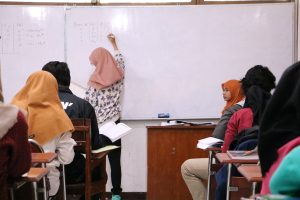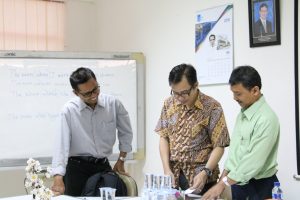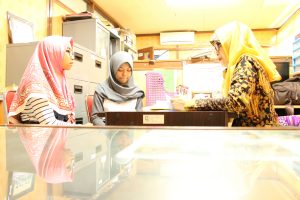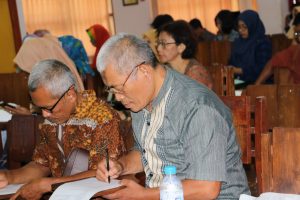Information Center Regarding Academic Activities in the Department of Business Statistics
In general, the Department of Business Statistics aims to develop Statistics and its application in various fields, particularly in the fields of: Industry, Business, Financial and Social-Population Economics, and Environment-Health. To achieve this goal, the Department of Business Statistics has two laboratories, namely the Quality and Productivity Engineering Laboratory and the Business Analytics Laboratory. In addition, to maximize learning monitoring and evaluation, the courses at the Department of Business Statistics are grouped into Clusters of Subjects (RMK), namely: Industrial RMK, Business RMK, Modeling RMK, and Formal Science RMK. In addition to monitoring and evaluating the learning process, the RMK Coordinator together with the Head of the Laboratory is tasked with compiling drafts of courses offered in each semester and drafts of supporting lecturers for each course.
The main objectives of the Department of Business Statistics are:
- Producing high-quality middle-level human resources in the field of Statistics, having the potential to develop and being able to contribute to the application of statistics in the fields of Industry, Business, Financial Economics, and Social-Population and Environmental-Health;
- Produce research on the application of statistics in the fields of Industry, Business, Financial Economics, and Social-Population and Environment-Health.
Based on the current condition of Human Resources and facilities, the targets and indicators for achieving the Study Program goals set for 2018 – 2023 are as follows:
- Governance Improvements and Improvements
- Structured HR development
- Focused and innovative Research and Learning
- Human empowerment
- Creation of a clean, safe, beautiful, orderly, and optimal environment in each basic component of the implementation of the study program which includes input and process
Education
The Learning Outcomes of the Business Statistics Department refer to the Learning Outcomes that ITS has set. Namely education is a process that starts from:
- Curriculum Formation
- Learning Process
- Producing Graduates
To support ITS’ ideals of producing graduates who: have noble character; excel in science and technology; have a noble and independent personality; professional and ethical; high integrity and responsibility; and are able to develop themselves and compete at national and international levels, the Department of Business Statistics has compiled Learning Outcomes as follows:
Education administration
According to Permenristekdikti No 44 of 2015 concerning SNDIKTI curriculum is a set of plans and arrangements regarding graduate learning outcomes, study materials, processes, and assessments that are used as guidelines for the implementation of study programs. Based on the ITS Curriculum Preparation Guidelines 2018-2023 article 9 paragraphs 1 and 2, the curriculum is a reference to the minimum quality standard for the implementation of a study program, which is a set of plans and regulations regarding the objectives, content, and learning materials and methods used as guidelines for implementing the study program objectives.
In accordance with the Presidential Regulation of the Republic of Indonesia No. 8 of 2012 concerning KKNI, the Curriculum of the Study Program at the Department of Business Statistics is prepared based on the learning outcomes of graduates referring to the Indonesian National Qualifications Framework (KKNI), where the Learning Outcomes of the Statistics Department curriculum include 4 elements, namely:
- Attitude
- General Skills
- Special skill
- Knowledge Acquisition
The preparation of Learning Outcomes (DP) of the Department of Business Statistics, in addition to covering the four elements, also takes into account the profile of graduates. Where the profiles of graduates from the Department of Business Statistics are as follows:
- Data analysis
- Quality Control/Quality Assurance
- PPIC
- bureaucrat
- Bank/Insurance Credit Analysis
- Cost Analysis
- Entrepreneur
- Marketing
In the new curriculum (2018-2023), there are subject limits for the D-III, D-IV, and Undergraduate Study Programs, namely the existence of compulsory National and ITS compulsory subjects, study program electives a maximum of 15 credits and 3 to 6 credits of courses enrichment.
Diploma IV Study Program
Study load (credits) 144 is divided into 2 stages:
- The Preparatory Phase 36 credits are scheduled over 2 semesters
- The 108 credits Diploma stage is scheduled for 6 semesters
Evaluation of student learning is carried out at least 4 times a year and the results are expressed in numbers and letters.
The following is the measurement scale:
| Numerical Value | Letter Value | Numerical Value | Mention |
| 86 – 100 | A | 4 | Special |
| 76 – 85 | AB | 3.5 | Very well |
| 66 – 75 | B | 3 | Good |
| 61 – 65 | BC | 2.5 | Pretty good |
| 56 – 60 | C | 2 | Enough |
| 41 – 50 | D | 1 | Not enough |
| 0 – 40 | E | 0 | Very less |
The measure of learning success is expressed in the Achievement Index (IP). While IPS is IP which is calculated from all courses taken in the semester concerned
News
Industrial Standardization as a candidate for quality alumni
Start developing yourself by participating in various programs that provide readiness to face the real world of work and certification of internationally recognized expertise.




